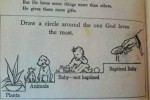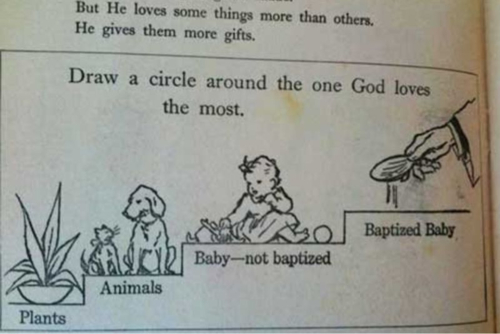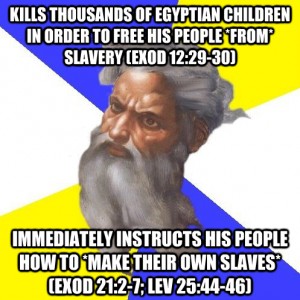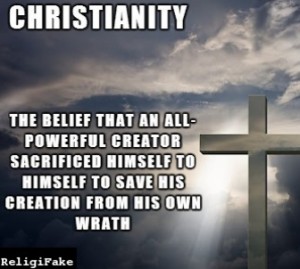 The Bible is full of bloody and gruesome portrayals, many of which are carried out at what appears to be the direct command of God.
The Bible is full of bloody and gruesome portrayals, many of which are carried out at what appears to be the direct command of God.
One atheistic author has written an entire book about these many thousands of passages in the Bible in which God blesses, causes, commands, or sanctions violence against human beings (Steve Wells, Drunk with Blood: God’s Killings in the Bible).
But it is not just atheists who notice and are troubled by such violent texts.
Many Christians consider the violent portions of Scripture to be the most troubling texts in all the Bible. In fact, I talked with one woman just this past week who has abandoned Christianity, largely because of the violent portrayals of God in the Bible. She said, “If there is a God, he is either is monstrous to cause such things, is impotent because he cannot stop them, or is absent and he does not care. Whichever way you go, such a god is not worthy of worship. ”
I couldn’t agree more.
I, too, could not worship a god like that.
Thankfully, I don’t think those are the only three options when trying to understand the violent portrayals of God in the Bible. I have tried to present my view in previous posts.
Yet although there are other options, this doesn’t mean it is easy to understand what is going on behind these bloody events in the Bible.
Most difficult to assess are passages portraying God as a bloodthirsty warrior—“I will make my arrows drunk with blood, while my sword devours flesh” (Deut 32:42)—or as burning with anger so ruthless it consumes the enemy “like stubble” (Exod 15:7). Also troubling are passages ordering the Israelites to “carry out the Lord’s vengeance” (Num 31:3); to “kill all the boys” and “kill every woman who has slept with a man” (Num 31:17); to “make no treaty with them, and show them no mercy” (Deut 7:2); to “not leave alive anything that breathes” (Deut 20:16); so that the Israelites “left no survivors” (Deut 2:34; Josh 10:39) (See Heath Thomas, Jeremy Evans, and Paul Copan, eds., Holy War in the Bible: Christian Morality and the Old Testament Problem, 189).
Over the course of the next several months, we are going to take a brief look at several of the violent and bloody portrayals of God in the Old Testament.
The analysis of these texts will be much shorter than the analysis of the flood in Genesis 6–8 because explaining all the texts in detail would simply mean that many of the same arguments and ideas presented as an explanation for one text would simply be repeated in an explanation for a different text. (See Paul Copan, Is God a Moral Monster? Making Sense of the Old Testament God).
Each text will be introduced in turn with a brief explanation of how God is portrayed in the passage, and this will be followed with a brief explanation of how to understand God’s actions in light of the Chaos Theory and in light of God taking on the sin of the whole world, just as Jesus did on the cross.
It must be reiterated, however, that not all the passages allow for a clear glimpse behind the curtain. While many of the violent and troubling depictions of God are explained in later texts of the Bible in a way which shows that God did not actually command or perform the evil that is ascribed to His name, many of the passages have no such explanation later in Scripture. So for those texts, we must simply rely on what we know about God through the revelation of Jesus, and also what we know about the six points of the Chaos Theory and how God has ordered the universe.
To prepare yourself for this series of posts, I strongly suggest you go read the previous posts I have written on this topic related to the Chaos Theory and the Proposal I am attempting to defend.
What are your thoughts on the violent portrayals of God in the Bible? Have you struggled with any of the bloody events in Scripture? Which ones?







 So since hell is not a place where God tortures people for eternity, I almost literally shake with anger when I read these words that
So since hell is not a place where God tortures people for eternity, I almost literally shake with anger when I read these words that 
 I sometimes hear pastors and teachers say that Jesus talked about hell more than heaven, and so we should do the same in our evangelism.
I sometimes hear pastors and teachers say that Jesus talked about hell more than heaven, and so we should do the same in our evangelism. inally, Gehenna refers to an actual place that existed outside the gates of Jerusalem. It was a little valley in which trash was thrown to be burned. This imagery must be understood wherever Jesus talks about “hell fire” and uses Gehenna (cf. Matt 5:22).
inally, Gehenna refers to an actual place that existed outside the gates of Jerusalem. It was a little valley in which trash was thrown to be burned. This imagery must be understood wherever Jesus talks about “hell fire” and uses Gehenna (cf. Matt 5:22).














 Note: This post is rated PG-13.
Note: This post is rated PG-13. Later in the song, Sisera’s mother is seen to looking out the window, wondering what is taking her son so long to come home, and her maids basically say, “Most likely he is out raping women and grabbing for their clothes; don’t worry, he’ll be home soon” (Judges 5:28-30). Little does she know that in taking women for himself, his life has been taken by a woman.
Later in the song, Sisera’s mother is seen to looking out the window, wondering what is taking her son so long to come home, and her maids basically say, “Most likely he is out raping women and grabbing for their clothes; don’t worry, he’ll be home soon” (Judges 5:28-30). Little does she know that in taking women for himself, his life has been taken by a woman.


 No, this is not a post about whether or not you have truly believed in Jesus for eternal life, or how to tell if you have truly trusted Jesus or not.
No, this is not a post about whether or not you have truly believed in Jesus for eternal life, or how to tell if you have truly trusted Jesus or not.
